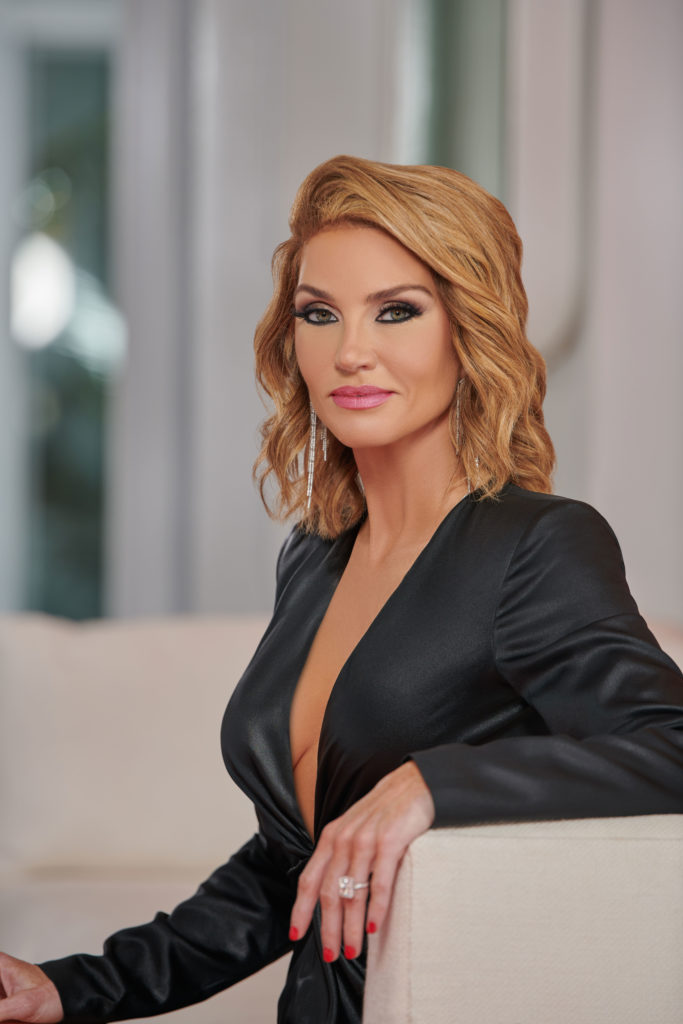Elena Cardone has many titles: entrepreneur, speaker, podcaster, best-selling author, mother, investor, actress, competitive sport shooter, wife, trained mixed-martial arts fighter, witty conversationalist, model—the list goes on.
She is someone who, by many definitions, has it all. But it would be too easy, too trite, too painfully distilled to write a story about a powerful woman who symbolizes to other women that they, too, can “have it all” if they just learn an impossible balancing act, all while finding time to advocate for other women and still look like some version of their 25-year-old selves.

Cardone does believe women can build their own version of an empire, but the oversold idea of balance is a filtered image of reality. Your life is your life, she says. Your life isn’t a pie chart of work, family, personal health, wealth building and personal interests—it’s just your life. When you separate the pieces to make individual time for each, you’ll always come up short and feel like a failure. Embracing the entirety of your life and all its conflicting pieces allows you to be at peace with yourself and with the moment at hand.
Maybe that means bringing the family on a business trip and carving out time for quick outings. Maybe it means openly discussing business at the family dinner table and encouraging questions. Maybe it means taking business calls during a break at a dance recital without feeling like an absentee parent.
For Cardone’s family, the lines between business, family, life and fun are not only blurred, they simply don’t exist. As partners in business, she and her husband, Grant, have clearly defined roles, and the office is never really closed. Their daughters, 12-year-old Sabrina and 10-year-old Scarlett, have both spoken at 10X GrowthCon. They have thriving Instagram accounts covering topics like “procrastination from a kid’s POV” and “developing an abundance mindset.”
This family dynamic wasn’t organic, much like the rest of Cardone’s life. The things she chooses to be, the person she chooses to present to the world, the life she’s carefully built, are all purposefully constructed from a thousand tiny daily decisions. First as an actress and model, then as an entrepreneur, speaker, author, podcast host and business coach. Those tiny decisions, the ones that often feel mundane, are the most important. One of her first decisions was perhaps the most important.
The decision to reverse-engineer her goals
At 17, Elena Lyons moved to LA with a singular goal of making it as an actress in Hollywood. Without contacts, help or money, she landed spots, working her way onto popular shows such as Two and a Half Men, CSI and Days of Our Lives. It starts, she says, with becoming who you want to be before you’re actually there.
“The order isn’t you have the thing and then you become it,” she says. “I always thought I had to become a movie star before I could be a movie star. You have to wear the role or the hat or the ‘beingness’ of a movie star. I was a ‘billionaire’ 10 years before it actually happened.”
Find the person you admire in the role or life position you want to be in and become a student of that person. How do they carry themselves? What do they have to know? How do they command the room? What is their confidence level?
Making goals and imagining yourself achieving them isn’t new advice, but looking at where you want your life to be in 10 or 20 years and keeping that laser focus on each of the tiny supporting decisions throughout the day is quickly fatiguing work. How many get excited about New Year’s resolutions only to fall back into whatever comfortable routine they were in at the end of the prior year? People don’t like change. They don’t like discomfort. They grow tired if progress doesn’t happen as quickly as they want.

Cardone keeps that laser focus by attaching a face and a personality and a way of being to what might otherwise be described as a vague vision board.
The decision to ask for (the right) help
“Do you remember what I said when I first stepped onto this stage?” Cardone asks the crowd of nearly 1,000 attendees at her 10X Ladies event at the JW Marriott Miami Turnberry Resort & Spa in Miami.
“You’re either building your empire or you’re destroying it,” the crowd chimes back in unison.
Cardone looks particularly fierce with a slicked-back high pony and black-and-gold cut-out Roberto Cavalli gown. She just finished telling the crowd how her original gown—also a Cavalli—is stuck somewhere in a New York blizzard. Her jewelry is somewhere between New York and Miami. She borrowed this one from a designer friend she met at random and quickly bonded with—this, she says, is just a small example of the power of the female collective. The quick off-topic ramble makes me feel simultaneously underdressed and as if I’m casually chatting with a friend about her weekend.
The night before the event, her husband asks what she plans to say to kick off the event—a typical conversation for them. She laughs, explaining her organic “winging it” approach feels more real to her, and she doesn’t want to overly script it.
“People will remember the first and the last thing you say,” he tells her. “They’ll forget everything in between.”
It seems like solid advice delivered from someone trustworthy in her life, right? She returns to her opening statement to make this point: People pass incorrect and inexperienced information around and around until it becomes something akin to fact. It’s up to you to filter that information.
“People think I listen to Grant because he’s my husband,” she says to the audience. “Or I would listen to my girlfriends because they’re my girlfriends. It makes sense and is natural… [But I listen to Grant] because he has stats in the area. That’s the only reason.”
Too often, Cardone says, we look to people we trust in one area of life and expect them to have the answers for all the others, even when they lack experience or education in that arena. People often blindly trust a distant relative for financial advice, for example. Or they look to their parents for career advice, despite the wildly different career landscape that exists now compared with 35 years ago. Or they look to an influencer for life advice, forgetting the curated nature of that experience.
“I used to confuse that if someone had one thing, that meant they had everything,” she says. “And too many times, people listen to the people in their life as if they are the source of the expertise.”
The decision to see red flags as a sign to dig deeper
Cardone doesn’t seem like someone who would open up to strangers. But here we are, at her kitchen table in her $28 million Ocean Avenue mansion she and Grant purchased from Tommy Hilfiger less than a year ago, talking about identifying our own worst flaws and using them as a jumping-off point for massive growth.

Right now it’s ex-boyfriends. Like we’re old friends, she’s chatting about the boyfriends who left emotional scars: lying, infidelity, gaslighting, jealousy. It reinforced her belief that to be a strong, independent woman meant never relying on anyone, especially a man.
“The first biggest mistake I ever made was thinking I had to do it all on my own,” Cardone says. “It was false information. I cut my nose off to spite of my face for years. You can do anything, but you cannot do everything. You need a team.”
For her, the sign to look deeper came after a third boyfriend with seemingly carbon-copied behaviors as the two previous.
“I have to look at it and take responsibility and say, ‘Wait a minute, maybe that didn’t just happen by accident. Maybe that happened because I cast that. If I’m casting a movie role and my life is my movie, maybe I cast them to make myself right about all men holding me back [in my career] and cheating.’”
As with most things, knowing the potential issue isn’t enough. And telling ourselves not to think or feel one way doesn’t automatically make it happen. But looking at the mindsets and beliefs we have about certain areas of our lives can give us insight into where we need to learn and where we need to pay attention.
From there, you explore the idea of changing that belief. Again, we’re not prescribing a solution. Change takes time and beliefs are difficult to unlearn. For Cardone, that meant starting with thinking, Can I be open to the possibility that a man can lift me up to a heightened level and be monogamous? She didn’t believe the words, but she let herself be open to the possibility. She met Grant the same year.

Our beliefs are strong, and they’re often formed without conscious choice. We adopt the beliefs of our parents, teachers and friends as children. We project those beliefs onto our decision-making, which reinforces their validity in our minds, and the cycle continues.
This applies to every area of life. Money mindsets can be some of the most gripping. If a child learns that “money is the root of all evil,” then their career decisions, wealth-building decisions, retirement-planning decisions can all be affected. But what if they open themselves to the idea that money is just paper, Cardone says, or that money can provide the opportunity to help more people?
The decision to be present
Cardone is 13 years old. She lives in New Orleans with her father, a WWII veteran, and her mother, who was the main earner for the family—an unusual concept for the time that’s not lost on Cardone. Next door lives her best friend, Goldie—the kind of friendship that feels like your whole world. Money is tight, but she is loved and happy and as carefree as a 13-year-old can be. Until the night she’s woken by her father with words that seem incomprehensible at the time: “Elena, Goldie’s house is on fire, and Goldie and her mother are still inside.”
Cardone believes that tragedy is part of what makes you who you are. The memory of Goldie haunts her, but to live in that past is to ignore how she can grow from it in the future. So she made the decision to be present, to care, to listen, to speak up—learning a sense of mortality at a young age can have that effect. She brings that presence into every room, with every person, no matter their title. I see it now, in the Cardone kitchen, as she chats with her executive assistant, Daniela Straugh.
“I think there’s a lot of people in the industry who’re just going for a get-rich-quick scheme, and it’s very clear in their messaging and how they treat their team,” Cardone says. “When you see a team that doesn’t communicate very well or a leader that doesn’t communicate well, that’s a sign of something, of a sickness in the organization.”
That dedication to communication is what makes her marriage thrive. She and Grant split responsibilities at home and in the business. What might seem like an overly calculated, romance-killing decision is the precise thing that keeps their relationship healthy and vibrant. Mixing business and family becomes messy when you stop communicating as business partners and establishing clear lines of ownership, Cardone says.
“The glue is being clear on the future,” she says. “Anytime we are having problems it is because one or both of us is stuck in the past.”
The decision to be unapologetically big
Cardone is no stranger to the labels given to strong women: bossy, rude and catty are a few mild options. She doesn’t care. She did once, and it was when her life felt most disconnected from her goals.
“I’ve always been this driven,” she says. “It was just misplaced and misfocused, and I didn’t know how to aim it in the right direction.”
There are many impressive things about Cardone, but her dedication to her daily routine is unmatched. She believes that staying uncomfortable is the surest way to keep her on track. We’re out by her infinity pool overlooking the Atlantic ocean as she lists all the ways she makes herself uncomfortable, including getting in this pool with full hair and makeup to indulge this photoshoot.

“Pressure makes diamonds,” she says. “I hate comfortable. I’m always putting myself in situations where I’m not comfortable. I do two hours of hardcore MMA training every day to make myself uncomfortable.”
It’s easy to hear the generic “get out of your comfort zone” advice and interpret it as “make the call even when you fear rejection.” Cardone, as with most things, 10X’s that advice.
“When I’m too comfortable, I get bored, I get in trouble,” she says with a smirk. “Every time I start fighting with Grant and we start playing these small little tit-for-tat games, it’s because we’ve forgotten our purpose and we’re playing too small. So for me, it’s a survival level at this point. I have to be playing on big levels right now, or I get myself in trouble. I’m not built to play small.”
* * *
Cardone is many things: driven, focused, smart, kind, communicative, caring, unapologetic. But she is not alone, and that’s just how she wants it. The next phase of her life and career is focused on helping lift up other women to their potential—through inspiration, training and example. She wants women to learn from her years thinking she had to do it alone, and instead embrace the collective power that comes from collaboration and mutual support.
“You need people,” she says. “The idea of a solopreneur is a lie. No one’s ever built an empire alone. Show me one instance of an empire in history that is from one person. We need people. We need the shared power and energy of collaboration. That’s everything.”
This article originally appeared in the July/August 2022 Issue of SUCCESS magazine. Photos by Bianca Pierre.










